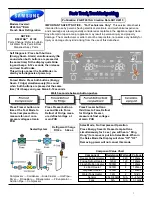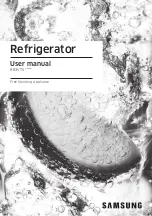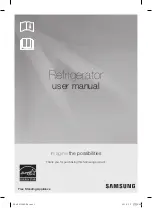
EN - 37
•
Your appliance is designed to operate in
the ambient temperature (T/SN = 10°C
- 43°C) intervals stated in the standards,
according to the climate class displayed
on the information label. We do not
recommend operating your appliance out
of the stated temperature limits in terms
of cooling effectiveness.
Climate
Class
Ambient Temperature
o
C
T
Between 16 and 43 (°C)
ST
Between 16 and 38 (°C)
N
Between 16 and 32 (°C)
SN
Between 10 and 32 (°C)
Important installation instructions
This appliance is designed to work in
difficult climate conditions (up to 43
degrees C or 110 degrees F) and is
powered with ‘Freezer Shield’ technology
which ensures that the frozen food in the
freezer will not defrost even if the ambient
temperature falls as low as -15 °C. So
you may then install your appliance in an
unheated room without having to worry
about frozen food in the freezer being
spoilt. When the ambient temperature
returns to normal, you may continue using
the appliance as usual.
3.5 Temperature indicator
In order to help you better set your
refrigerator, we have equipped it
with a temperature indicator
located in the coldest area.
To better store the food in your
refrigerator, especially in the
coldest area, make sure the
message “OK” appears on the
temperature indicator. If « OK » does not
appear, this means temperature has not
been set properly
It may be difficult to see the indicator,
make sure it is properly lit.Each time the
temperature setting device is changed,
wait for the stabilisation of the temperature
inside the appliance before proceeding,
if necessary, with a new temperature
OK
setting. Please change the position of the
temperature setting device progressively
and wait at least 12 hours before starting a
new check and potential change.
NOTE:
Following repeated openings
(or prolonged opening) of the door or
after putting fresh food into the appliance, it
is normal for the indication “OK” not to
appear in the temperature setting indicator.
If there is an abnormal build up of ice
crystals of ice crystals (bottom wall of the
appliance) on the refrigerator compartment,
evaporator (overloaded appliance, high
room temperature, frequent door openings),
put the temperature setting device on a
lower position until compressor off periods
are obtained again.
Store food in the coldest area of the
refrigerator.
Your foods will be better stored
if you put them in the most
appropriate cooling area. The
coldest area is just above the
crisper.
The following symbol indicates the coldest
area of your refrigerator.
To be sure to have a low temperature in this
area, make sure the
shelf is located at
the level of this
symbol, as shown in
the illustration.
The upper limit of
the coldest area
is indicated by the
lower side of the
sticker (head of the arrow). The coldest
area upper shelf must be at the same level
with the arrow head. The coldest area is
below this level.
As these shelves are removable, make
sure they are always at the same level with
these zone limits described on the stickers,
in order to guarantee temperatures in this
area.
Summary of Contents for RNV3810DSN
Page 1: ...RNV3810DSN RNV3810DWN NO FROST RU Freezer Fridge User Manual EN...
Page 2: ...RU 2...
Page 4: ...RU 4 1 1 1 R600a...
Page 5: ...RU 5 R600a...
Page 6: ...RU 6 16 8...
Page 7: ...RU 7 3 8 0 3 3 8 8 14 2000...
Page 8: ...RU 8...
Page 9: ...RU 9 1 2 220 240 50 50 5 2 150 90...
Page 10: ...RU 10 75 1 3...
Page 11: ...RU 11...
Page 13: ...RU 13 3 3 1 No Frost No Frost No Frost 3 2 C o 8 6 5 4 2 3 3 3 3 1 6 o C 8 6 5 4 2...
Page 14: ...RU 14 1 3 3 3 2 3 3 3 3 3 4 2 3 4 10 C 24 5 5...
Page 16: ...RU 16 3 6 3 6 1 3 6 2 3 6 3...
Page 17: ...RU 17 4 4 1 1 2 i...
Page 18: ...RU 18 1 2 3 3 4 1 1 4 2...
Page 19: ...RU 19 24 4 C 24 2 C 24 24...
Page 22: ...RU 22 5 1 6 6 1 6 2...
Page 23: ...RU 23 7 No Frpst...
Page 24: ...RU 24 4 5...
Page 25: ...RU 25 8 1 2 3 4 5 6 7...
Page 47: ...EN 47...












































